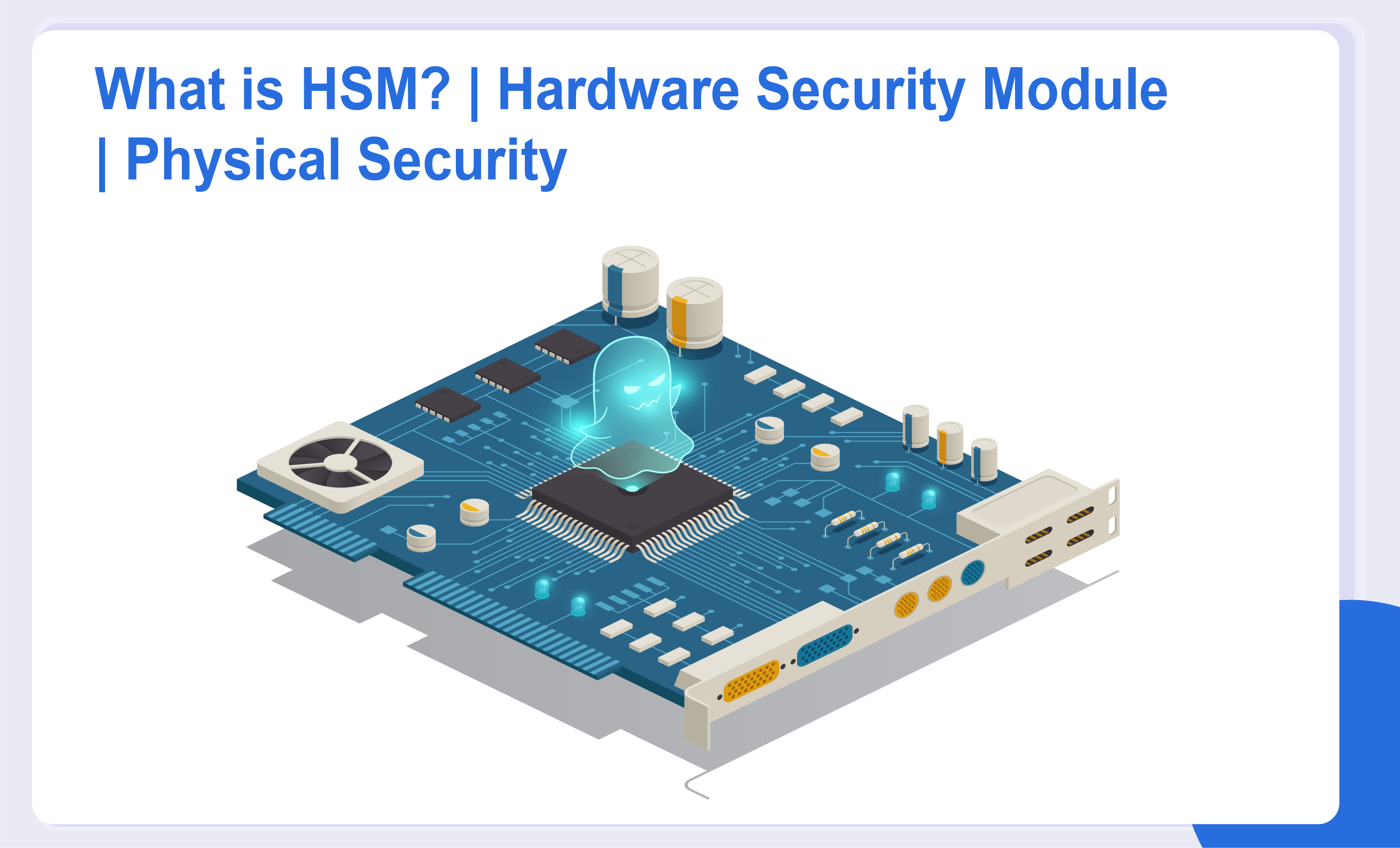What is Hardware Security Module? Benefits of Physical Security
Table of Contents
What is a Physical Hardware Security Module(HSM)?
Today, companies’ security needs require them to have a high level of protection, particularly when it comes to data.
Including payment methods like credit cards to personal consumer details and business data, companies that are managing all these details need to make sure that they are secure.
A hardware security module (HSM) is designed to provide businesses in a variety of industries that need to safeguard their data with an extremely high degree of protection.
What is HSM?
Hardware Security Module (HSM) is a physical device that is tamper-proof and safeguards secret digital keys, which helps to strengthen asymmetric/symmetric key cryptography. They are used when implementing PKI or SSH to achieve a high degree of data protection and trust. HSMs have an extra protection layer by keeping the decryption keys separate from the encrypted data. This way, even when a hack happens, it avoids revealing data that is encrypted.
HSMs usually come as a plug-in system that can directly connect to a computer or a network server. Often, HSM tools safely back up the keys they are managing outside the HSM. Certificate Authorities (CAs) often use HSMs to produce, store, and manage asymmetric key pairs.
What are the types of HSM?
The HSM devices can be classified into two types, depending on the requirements:
HSM for transaction and payment
Various HSM payment transaction security tools include the use of a PIN (development, management, validation, and translation of the PIN block in POS and ATM transactions), the security of electronic fund transfers (EFT), development of magnetic stripe and EMV chip data in card production and customization processes, processing of payment transactions. Usually, these systems provide cryptographic support for most card brands’ payment applications, and their interconnection interfaces are typically more restrictive than HSMs for generic use.
General-purpose HSM
HSM devices provide a variety of standard encryption algorithms (symmetric, asymmetric, and hash functions) with API interconnectivity support using Public-Key Cryptography Standard (PKCS) # 11, Microsoft Cryptographic Application Programming Interface (CAPI), Cryptography API Next Generation (CNG), Java Cryptography Architecture (JCA), Java Cryptography Extension (JCE). Such tools are typically used, among others, in PKI environments, HTTPS channels, DNSSEC, generic sensitive data security, and crypto wallets.
HSM in the modern world –
Several industries and businesses have come to rely on HSM devices for fast, reliable, and stable data transactions, and verification with wide-ranging use cases. Whatever use case may be, any HSM device’s key elements allow the following:
- Is built using well-tested and qualified, specialized hardware;
- Has an Operating System with a security orientation;
- Has access to a network interface which has strict internal parameters regulated;
- Cryptographic material is actively stored and protected
Any programmer will usually combine in a single application – the database access code, business logic, and cryptographic calls leaving it highly vulnerable to manipulation and attack. It is a risky strategy because an attacker can manipulate designed data to access cryptographic materials, steal keys, add an arbitrary certificate, etc.
HSM systems need two different operating zones to avoid these intrusions:
- Keeping the business logic; and
- Being entrusted with the cryptographic activity for the cryptography.
What are the benefits of using an HSM?
Using an HSM to secure your data has several advantages.
- Having HSM as a service. Some IT providers offer HSM as a service for companies that cannot afford to invest in an HSM but need to have PCI DSS certification, which makes this technology more accessible and affordable for some businesses.
- Achieve defense which is tamper-proof. Many HSMs are noticeable in the manipulation; and others are resistant to manipulation depending on their features, offering a degree of protection that is difficult to achieve by using software alone.
- Seriously consider the customer data. Show customers that you are taking their privacy seriously by going the extra mile to safeguard their information, particularly information about their payments.
- Offers maximum security. HSMs have one of the highest levels of protection against external threats. Using it is secure and helps protect against malicious hacks.
- Hold your key in one single location. Unlike storing a key in software — where it could end up virtually anywhere — the HSM alone holds the key, making tracking and safeguarding easier. The key can't exit the device.
Why choose Teceze for HSM?
Hardware security modules are at the root of daily business at Teceze. Teceze is a leading specialist supplier of Hardware Security Modules to the world. With a long history in the field of more than 10 years, the Crypto Server HSM platform has many unique and strong technological features to it. This makes it an ideal choice to protect cryptographic keys, digital infrastructures, and data assets that are vital to business. Teceze HSMs fulfill the most demanding security requirements to serve their function as a Root of Trust.
While entities are dealing with more sensitive data that would benefit from an HSM, companies in all sectors are searching for better ways to protect their information and avoid breaches of security.
Eventually, all organizations, such as those listed in the PCI DSS certification, may need to follow requirements. Businesses understand the need for better protection and taking advantage of an HSM will help enforce more successful steps that not only contribute to enforcement but also to peace of mind.
The only way to protect what you’ve worked hard to build is to be vigilant when it comes to cybersecurity. If you’d like to know more about how your business can benefit from managed services, just give us a call, we are here to help.
Today, companies’ security needs require them to have a high level of protection, particularly when it comes to data.
 Back to Insights
Back to Insights
 Previous
Previous 